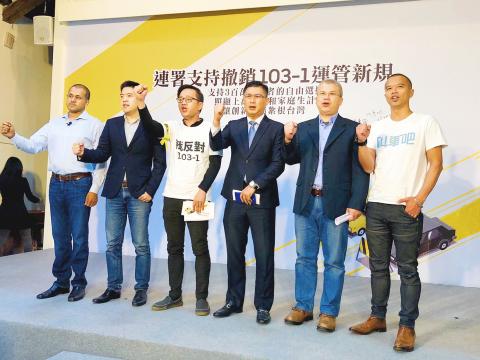Uber Technologies Inc yesterday appealed to the government to halt its “heavy handed” regulatory changes, while Uber drivers are planning a protest this month over the Ministry of Transportation and Communications’ new rules that they say would damage the firm’s ride-hailing business.
The ministry in February proposed a draft amendment to Article 103-1 of the Transportation Management Regulations (汽車運輸業管理規則), which would prohibit payment regimes for rental vehicles of less than one hour, and limit discounts and promotional deals. The proposed rules would also require rental vehicles to “return to the garage” after every trip.
Uber Taiwan has petitioned the ministry, but to no avail, it said.

Photo: Kao Shih Ching, Taipei Times
The consultation period for the proposed changes is to end on April 26.
“We call on the government to extend the consultation period and invite all parties to talk, as it has had no or limited talks with ride-hail platforms, driver-partners and riders,” Uber regional general manager for Asia Pacific Amit Jain told a news conference in Taipei.
Jain, who was in charge of Uber’s India operations, told the Taipei Times that when he dealt with regulatory headwinds in his previous role, the firm and the Indian government had comprehensive discussions about regulatory changes, but such dialogue is lacking in Taiwan.
He would continue to petition the government at meetings, Jain said.
“We remain hopeful that our voices will be heard by the ministry and we will continue to work with our partners,” he said.
As it is difficult to forecast the worst-case scenario at the moment, Uber could not confidently say it would leave Taiwan, he said.
The ministry has suggested that Uber Taiwan transfer its drivers to the ministry’s multi-purpose taxi (MPT) program, but the firm would not consider that option, as it is similar to a traditional taxi system and requires drivers to adopt fixed fares, Jain said.
“The MPT system is the opposite of Uber and far from our vision to change the taxi industry,” he said.
The ministry’s planned changes would hurt not only Uber, but also local platform operators, said Johnny Lai (賴群森), founder of locally developed cab-hailing start-up Call Car Bar (叫車吧), which has 1,000 drivers.
If drivers join the MPT program, they would need to comply with taxi regulations and would no longer be allowed to offer airport pickup services, Lai said.
In light of advanced technologies, the government should adapt to new concepts and supervisory methods for taxi and cab-hailing businesses such as Call Car Bar and Uber, Lai said.
“We are all angry, as the ministry is to sacrifice our rights to protect taxi drivers,” said Well Lee (李威爾), spokesperson of the Platform Driver Alliance, a group organized by Uber drivers.
The alliance is to protest, with a tentative date of April 21, he said, adding that most of Uber’s 10,000 drivers would participate.
The alliance has launched a petition urging the ministry to drop the proposed amendments, Lee said.
The petition has gained more than 100,000 signatures from Uber riders, he said.

The Eurovision Song Contest has seen a surge in punter interest at the bookmakers, becoming a major betting event, experts said ahead of last night’s giant glamfest in Basel. “Eurovision has quietly become one of the biggest betting events of the year,” said Tomi Huttunen, senior manager of the Online Computer Finland (OCS) betting and casino platform. Betting sites have long been used to gauge which way voters might be leaning ahead of the world’s biggest televised live music event. However, bookmakers highlight a huge increase in engagement in recent years — and this year in particular. “We’ve already passed 2023’s total activity and

Nvidia Corp CEO Jensen Huang (黃仁勳) today announced that his company has selected "Beitou Shilin" in Taipei for its new Taiwan office, called Nvidia Constellation, putting an end to months of speculation. Industry sources have said that the tech giant has been eyeing the Beitou Shilin Science Park as the site of its new overseas headquarters, and speculated that the new headquarters would be built on two plots of land designated as "T17" and "T18," which span 3.89 hectares in the park. "I think it's time for us to reveal one of the largest products we've ever built," Huang said near the

BIG BUCKS: Chairman Wei is expected to receive NT$34.12 million on a proposed NT$5 cash dividend plan, while the National Development Fund would get NT$8.27 billion Taiwan Semiconductor Manufacturing Co (TSMC, 台積電), the world’s largest contract chipmaker, yesterday announced that its board of directors approved US$15.25 billion in capital appropriations for long-term expansion to meet growing demand. The funds are to be used for installing advanced technology and packaging capacity, expanding mature and specialty technology, and constructing fabs with facility systems, TSMC said in a statement. The board also approved a proposal to distribute a NT$5 cash dividend per share, based on first-quarter earnings per share of NT$13.94, it said. That surpasses the NT$4.50 dividend for the fourth quarter of last year. TSMC has said that while it is eager

China yesterday announced anti-dumping duties as high as 74.9 percent on imports of polyoxymethylene (POM) copolymers, a type of engineering plastic, from Taiwan, the US, the EU and Japan. The Chinese Ministry of Commerce’s findings conclude a probe launched in May last year, shortly after the US sharply increased tariffs on Chinese electric vehicles, computer chips and other imports. POM copolymers can partially replace metals such as copper and zinc, and have various applications, including in auto parts, electronics and medical equipment, the Chinese ministry has said. In January, it said initial investigations had determined that dumping was taking place, and implemented preliminary